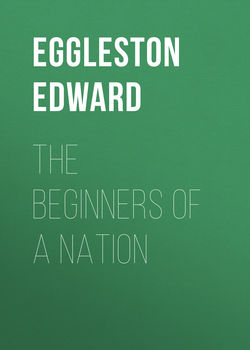Читать книгу The Beginners of a Nation - Eggleston Edward - Страница 29
BOOK I.
RISE OF THE FIRST ENGLISH COLONY
CHAPTER THE THIRD.
THE PROCESSION OF MOTIVES
I
ОглавлениеThe chief mistake. The cause of the sorrows of Virginia will be more plainly seen if we turn again to the motives that propelled Englishmen to plant a colony. The chief mistake lay in the main purpose. If the founding of a state had been other than a secondary and remote end, the managers might have sent at first families and not bachelors, farmers and not gentlemen, laborers and not riff-raff. But more visionary motives dominated the action. A state was planted, but something else was mainly intended by the first projectors. The work seemed continuous, but the end in view shifted and the actors gradually changed. The only motive that held from first to last, and ran through all the rest, was the rivalry with Spain.
The rivalry with Spain. The colonies attempted by Frobisher and Gilbert were to serve as relays in the work of exploration for a sea passage to the Pacific and the search for mines, but they mark strongly the influence of the Spanish example on English projects. Ralegh was a lifelong opponent in peace and war of Spanish intrigue and aggression, and his efforts to plant colonies in the virgin land were suggested by a knowledge of the almost exhaustless treasure that flowed into Spanish coffers from America. The opportune capture of a Spanish carack bound homeward from Mexico with letters describing the wealth of Mexican mines brought the support of English merchants to Ralegh's undertaking. Imbued with the same spirit, Ralegh's governor wrote from Roanoke Island in 1585 that his colony would be a means of deliverance from the domination of Spain, "whose strength doth altogether grow from the mines of her treasure." Lane to Sydney. Aug. 12, 1585. Sainsbury. In the perilous isolation of the little company on Roanoke Island, Lane assures himself that God will feed his men by means of ravens rather than suffer their "enemies the papists" "to triumph at the overthrow of this most Christian action." Lane to Walsingham. Aug. 12, 1585. Sainsbury. The home-staying English of that age were spurred to colony-planting by three main motives – cupidity, patriotic feeling, and religious zeal – and all of these were provoked by emulation and jealousy of Spain. 26
26
Two of the chapter heads to Hakluyt's Westerne Planting, printed in 2d Maine Historical Collections, ii, sufficiently indicate the views prevailing at the time:
"V. That this voyadge will be a greate bridle to the Indies of the Kinge of Spaine, and a meane that wee may arreste at our pleasure for the space of tenne weekes or three monethes every yere, one or two hundred saile of his subjectes Shippes at the fysshinge in Newfounde lande.
"VI. That the mischefe that the Indian threasure wroughte in time of Charles the late Emperor, father to the Spanishe Kinge, is to be had in consideration of the Queens moste excellent Majestie, least the contynuall comynge of the like threasure from thence to his sonne worke the unrecoverable annoye of this realme, wherof already wee have had very dangerous experience."
The heading of the first chapter should be added: "I. That this westerne discoverie will be greately for thinlargemente of the gospell of Christe whereunto the princes of the refourmed relligion are chefely bounde, amongst whome her Majestie ys principall."
It would be foreign to the purpose of the present work to tell the story of Spanish jealousy of Virginia, and of the diplomatic intrigues for the overthrow of the colony. See documents in Mr. Alexander Brown's Genesis of the United States. One can not but regret that Mr. Brown did not give also the original of his Spanish papers; no translation is adequate to the use of the historian.
Note 2, page 78. This method was recommended to the colonists as late as 1753 in Pullein's Culture of Silk for the Use of the American Colonies, and it had probably long prevailed on the continent of Europe.
